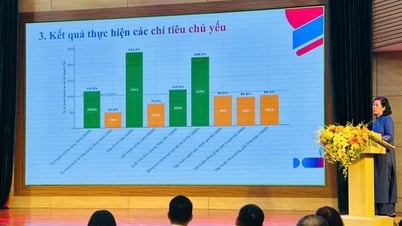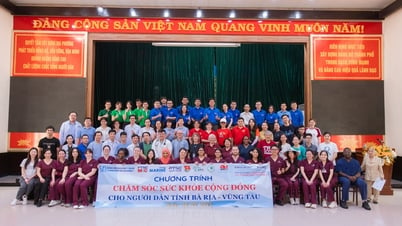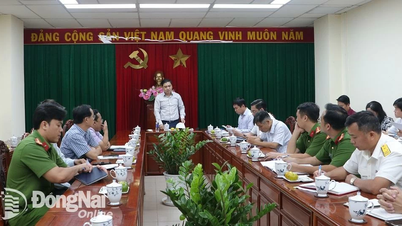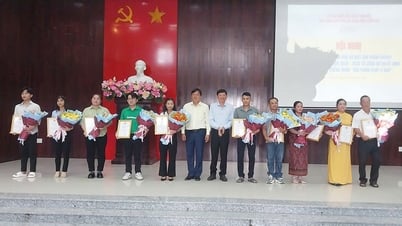From “important ingredient” to “most important driver”
The outstanding and profound breakthrough of Resolution 68 is the fundamental change in perception of the position and role of the private economy .
If in the past, this sector was often mentioned as an important “component”, now the Resolution has strongly affirmed: The private economy is the most important driving force of the economy. This turning point is not only a change in language, but also a profound change in strategic thinking, demonstrating the far-sighted vision of the Party and State in the new context.
After nearly 40 years of Doi Moi, especially during the period of national opening and deep international integration, Vietnam's private economy has risen strongly. From being just a small economic sector, the private economy has continuously grown in quantity, scale and quality, contributing increasingly to GDP, creating jobs and promoting innovation.
The private economic sector currently has about 940 thousand enterprises and more than 5 million business households in operation, contributing about 50% of GDP, more than 30% of total state budget revenue and employing about 82% of the total labor force in economic growth, job creation...
Resolution No. 68-NQ/TU dated May 4, 2025 of the Politburo on private economic development.
The private economy has shown remarkable growth with prominent names such as Vingroup, VinFast, FPT, Vietjet, Masan , Thaco, Hoa Phat, Trung Nguyen, Vinamilk, Sungroup, TH Group... These corporations and enterprises not only affirm their solid position in the domestic market, but also boldly invest and participate more and more deeply in key economic sectors such as heavy industry, construction, technology, finance, aviation, retail, agriculture...
Vietnamese private enterprises are also at the forefront of applying advanced science and technology, innovating, creating products and services with high intellectual content, meeting the increasingly demanding needs of the market. Many enterprises have mastered modern production processes, confidently competing with foreign rivals. Not stopping there, with the aspiration to reach out to the big sea, Vietnamese private "giants" have been gradually positioning the national brand on the world economic map. "Made in Vietnam" products bearing the mark of private enterprises are increasingly appearing in the international market, participating in the global value chain.
However, in reality, this sector still faces many barriers in terms of mechanisms, policies, fair competition and access to resources. Therefore, the private economy “has not yet made a breakthrough in terms of scale and competitiveness, and has not met requirements and expectations”.
Resolution 68, by identifying the private economy as the most important driving force, has officially placed this sector at the center of the development process. This is a worthy recognition for the great efforts and contributions of the private business community and enterprises, and at the same time opens a new chapter, where all potentials and aspirations of this sector are awakened and maximized.
Providing this historic opportunity not only demonstrates absolute confidence in the inherent capacity of the private economy, but is also a strategic decision to make the most of social resources, promote innovation, improve labor productivity and economic competitiveness in the context of deep international integration.

Specific goals, high political determination
The key difference of Resolution 68 lies not only in the change in perception of the role of the private economy, but also in the setting of very specific goals, accompanied by very high political determination, completely consistent with the requirements of the tasks in the period when the country enters a new era - the era of national development.
GOAL BY 2030
>> The private economy is the most important driving force of the national economy; a pioneering force in the development of science and technology, innovation and digital transformation...
>> Strive to have 2 million businesses operating in the economy, 20 businesses operating/1,000 people. Have at least 20 large businesses participating in the global value chain.
>> The average growth rate of the private economy is about 10-12%/year, higher than the growth rate of the economy; contributing about 55-58% of GDP, about 35-40% of total state budget revenue, creating jobs for about 84-85% of the total workforce; labor productivity increases on average about 8.5-9.5%/year.
>> Level, technology capacity, innovation, digital transformation are among the top 3 countries in ASEAN and the top 5 countries in Asia.Resolution No. 68-NQ/TU dated May 4, 2025 of the Politburo on private economic development.
The Resolution no longer stops at general statements, but has clearly quantified the goals of private economic development. Determining these specific indicators not only creates a clear reference framework for policy planning and implementation, but also serves as a measure to evaluate the effectiveness and responsibility of all levels and sectors in implementing the Resolution.
In the context of many fluctuations in the international and regional context, Vietnam's demonstration of strong political determination in developing the private economy is both an internal need and a strong message to the international community about a dynamic, innovative and potential Vietnam. This determination will create strong confidence for domestic and foreign investors, stimulate the spirit of entrepreneurship and innovation in the country, creating momentum for Vietnam to rise strongly in the new era.
Breakthrough solution
Sharing at the workshop "Removing policy shortcomings to promote the role of the private economy in the Vietnamese economy" held last March, Dr. Can Van Luc, economic expert, member of the National Financial and Monetary Policy Advisory Council, said that since the 1980s, China has gradually expanded the role of private enterprises in the economy, along with institutional, financial and technological reforms. In particular, from the 19th Congress (2017) to the 20th Congress (2022), the country continued to affirm the central role of the private sector, with a strategy of "both support and control". The Government has promoted administrative reform, created a transparent and stable business environment, reduced legal barriers and informal costs. In particular, private enterprises have access to preferential credit, reduced taxes and fees and encouraged innovation.
In 1978, China had just 155,000 household businesses; by 2024, that number had skyrocketed to more than 55 million private businesses and 124 million individual businesses. Today, the country’s private sector contributes about 60% of GDP, 50% of budget revenue, and creates 80% of urban jobs. The private sector also accounts for 92% of China’s enterprises, more than 70% of high-tech inventions, and more than 80% of the country’s 14,600 “small giants” – globally competitive mid-sized technology companies.
Practical experience from China is a testament to the power of the right strategic orientation. With the breakthrough decisions of Resolution 68, we can completely trust and expect a future of outstanding development of the private economy, especially with 5 guiding viewpoints, 8 tasks, and very basic, breakthrough and comprehensive solutions, demonstrating a deep understanding of the barriers and development needs of this sector.
Notably, the Resolution emphasizes the continued improvement of the socialist-oriented market economy institution, ensuring healthy competition among economic sectors. This includes reviewing, amending and abolishing overlapping and contradictory legal regulations that cause difficulties for private enterprises' business operations.
In particular, the Resolution focuses on ensuring legitimate property rights, real freedom of business, creating a level playing field in accessing resources (capital, land, technology, information) and market opportunities. Specific solutions such as simplifying administrative procedures, reducing compliance costs, improving the effectiveness and efficiency of the state apparatus, and enhancing transparency and accountability are given special attention.
Once the breakthrough solutions in Resolution 68 are implemented synchronously and effectively, they will certainly create a new wind, strongly arousing the potential and creativity of the private economy, making this sector truly the most important driving force, contributing worthily to the double-digit growth target in the coming period.
In the historical flow of national development, every major decision of the Party and State always carries within it the power to guide and inspire great leaps forward. Resolution 68 is such a major decision. This is not only an important political document, but also a strong declaration of the Party and State's trust and expectations for the private economic sector.
With Resolution 68, the "golden era" for Vietnam's private economy officially began.
Source: https://hanoimoi.vn/nghi-quyet-68-ky-nguyen-vang-cho-kinh-te-tu-nhan-701350.html



![[Photo] Prime Minister Pham Minh Chinh chairs conference to promote public investment growth momentum](https://vphoto.vietnam.vn/thumb/1200x675/vietnam/resource/IMAGE/2025/5/20/7d1fac1aef9d4002a09ee8fa7e0fc5c5)


















































































Comment (0)